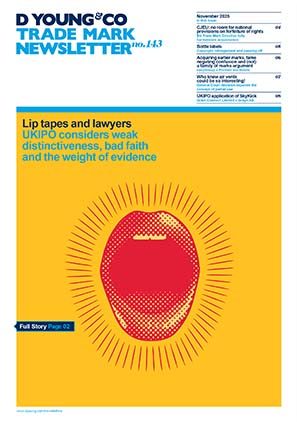Google Ads and meta tags: CJEU assesses jurisdiction and consumer targeting
Under Article 125(5) of the European Union Trade Mark Regulation (EUTMR) an EU trade mark proprietor can bring an infringement action before an EU trade mark court of the member state where the act of infringement is committed or threatened. However, this can become difficult in cases of online advertisements.
The Court of Justice of the European Union (CJEU) has now expanded on previous case law, providing a number of different factors which can play into the assessment of whether there is a sufficient connecting factor between the infringing act and the member state.
Background
The plaintiff, Lännen, owned an EU trade mark for WATERMASTER, which was registered and used for amphibious dredgers.
Lännen sued two defendants before a Finnish court alleging that the acts of online infringement took place in Finland. Both defendants challenged the international jurisdiction of the Finnish court claiming that they didn’t target the Finnish market or sell their products in Finland.
The burden of proof
As a starting point, the CJEU confirmed that to establish jurisdiction of a particular member state under Article 125(5), the plaintiff need only show evidence which gives rise to “a reasonable presumption” that acts of infringement may have been committed or threatened within the territory.
The infringing acts
The first defendant, Senwatec, purchased Google Ads so that if you searched WATERMASTER on google.fi with a Finnish IP address Sewantec’s advert would show up, which read “watermaster multipurpose amphibian dredgers – senwatec.de”.
On the defendant’s German website that the ad directed to, there was a map and list of countries in which the defendant claimed to be active, but Finland was not on the list.
For the first claim, the CJEU found that paying for Google Ads on google.fi was a sufficient connecting factor giving rise to an action in Finland, regardless of whether Finland was explicitly listed as a territory the defendant supplied.
The plaintiff alleged a second defendant, Berky, was infringing WATERMASTER by using it as a meta tag on the photo-sharing platform flickr.com for images of Berky’s machines. Here, a search on google.fi for “watermaster amphibious dredger” produced a link to Berky’s images on flickr.com as an organic search result. The result and images did not contain any geographical reference.
For the second claim, the CJEU confirmed that the natural referencing of images of its goods (via a keyword or meta tag) on an online photo-sharing service, under a generic top-level domain (like flickr.com), is not sufficient as a connecting factor. Flickr had a generic top-level domain (TLD), which suggested it was not intended for the public of any specific EU member state, and the meta tag was instead intended to enable search engines to identify the images.
The judgment assists in providing a non-exhaustive list of factors to assess whether activity is directed to a particular EU member state, including:
- The international nature of the activity.
- Use of a language or currency other than those used in the EU member state where the business is established.
- Mention of telephone numbers with an international code.
- Paying an internet referencing service to facilitate access to the business’s website (in this case Google Ads).
- Use of a top-level domain name other than that of the member state in which the business is established.
- Mention of an international customer base composed of customers domiciled in various member states.
Comment
The key takeaway is that infringements in the form of online advertising and online product offers are committed where the targeted consumers are located, so care should be taken to determine at whom the advertising and offers are directed.
Pay particular attention to whether the online advertisement or offer for sale is made through a national top-level domain of a specific member state (for example, Google.fi) as opposed to a generic top-level domain (for example, Flickr.com).
Paid referencing on a search engine website, using the national top-level domain of a member state, can be an infringement in that territory, regardless of whether the member state is expressly listed by the defendant as a territory it supplies.
Notwithstanding the above, it is not a sufficient connection where the allegedly infringing act involves natural referencing of images of a defendant’s goods (via a keyword or meta tag) under a generic top-level domain.
Case details at a glance
Jurisdiction: European Union
Decision level: CJEU
Parties: Lännen MCE Oy and Berky GmbH and Senwatec GmbH & Co KG
Citation: C‑104/22
Date: 27 April 2023

